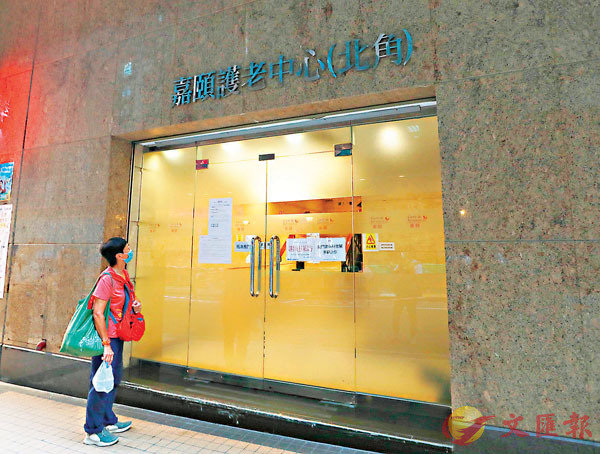 ● 嘉頤護老中心院舍被大幅加租。 資料圖片
● 嘉頤護老中心院舍被大幅加租。 資料圖片【原文】疫情當前,各行各業慘淡經營,不少業主凍租甚至減租,與租戶共度時艱。但天后嘉頤護老中心遭業主大幅加租倍半,護老中心被迫結業,近80名長者頓失所依。逆市加租,如同趁疫「打劫」,是無良企業所為,更擾亂市場,製造擴散效應,不利安老服務。政府應有擔當,主動協調解決事件,保障長者正當權益不受損害。若業主大幅加租趕走長者,只為將物業高價賣給政府作福利設施,政府更應設定黑名單懲罰機制,以免政府的良好初衷被濫用。
嘉頤護老中心院舍續租時,被業主要求由20多萬元大幅加租至近50萬元,近80名長者家屬上周接獲院舍通知,需於2月底前搬走,頓感彷徨無助。疫情嚴峻加上臨近農曆新年,要在此時為長者另覓宿位,根本強人所難,更對防疫工作不利。
受疫情影響,本港過去一年商業租金普遍下跌,處處吉舖。差估署最新資料顯示,去年全年租金指數下跌6%,寫字樓、商舖租金更錄得雙位跌幅,預料今年仍有下跌壓力。在這種情況下,護老中心的業主大幅加租顯然背離市場實況。
另外,護老中心是疫情「高危地」, 需請更多人清潔院舍、購買更多防護裝備,安排長者、員工接受檢測等,經營成本驟增。在此情況下,業主更應承擔社會責任,對經營護老中心的租戶凍租甚至減租,至少不能大幅加租。現在的做法,全然不管租戶和長者死活,造成十分負面的示範效應。
對於業主逆市加租,有立法會議員估計,可能與政府去年推出的200億元購置福利設施計劃有關,某些業主乘續約之機,加租趕走原來租客,「清場」之後將物業以高價賣給政府。如果這真的是業主加租的「如意算盤」,那豈不是等同政府間接趕走長者,令長者失去照顧,這肯定有違政府購置福利設施計劃的初衷。
社會福利署應盡快調查事件,必須保障受影響長者得到妥善安排,絕不能以不干預商業運作為理由袖手旁觀,否則勢必被社會詬病姑息養奸。
政府更需要明確購置福利設施計劃的實施細則,不容許有業主借政策牟取不義之財;對加租逼遷的無良業主,政府應將其列入黑名單,不購買相關物業,彰顯政府照顧長者、對市民負責的擔當。 ( 摘錄自香港《文匯報》社評 2021-1-28)
Government should blacklist unscrupulous landlords who take advantage of the pandemic
【譯文】As the Covid-19 pandemic wreaks havoc on businesses, many landlords chose to weather the storm with tenants by freezing or even reducing rent. However, the landlord of the Care & Services Elderly Home in Tin Hau significantly increased the rent by 150 per cent, forcing the elderly home to close down with nearly 80 elderly people losing their homes. Increasing rent in such difficult times is blatant exploitation. Not only does it disrupt the market, but it also sets a poor example and is detrimental to elderly services. The government should take the initiative to resolve the incident to protect the legitimate rights and interests of the elderly. If the landlord increases rent just to drive away the elderly and then sell off the property at a high price to the government, whose intent for the property acquisition is to provide welfare facilities, the government should consider setting up a blacklist mechanism to make sure its policies are not abused.
During the negotiation of lease renewal, the landlord requested a substantial increase of rent from around HK$200,000 to nearly HK$500,000 per month. In the aftermath, family members of the 80 elderly residents were left stranded as they received a notice last week that the residents need to move out before the end of February. As the pandemic is still raging on in Hong Kong while the Chinese New Year holidays are also approaching, it would be extremely difficult for the families to find new care homes for the elderly. The relocation of the elderly people might also have an impact on the government's efforts to contain the pandemic.
Due to the Covid-19 pandemic, commercial rents in Hong Kong have generally fallen over the past year, and empty retail shops waiting for lease can be seen everywhere. According to the latest figures from the Rating and Valuation Department, the rental index fell by 6 per cent last year, with the rents of office buildings and shops both recorded a double-digit decline. It is also expected that there will continue to be downward pressure this year. Under such circumstances, the landlord of the elderly care centre has obviously lost touch with reality by substantially increasing the rent.
Besides, elderly care centers are considered high risk in the Covid-19 pandemic. Operating expenses have soared as more manpower and money are needed in keeping the premise clean, purchasing more personal protective equipment, and arranging for the elderly and employees to undergo testing. The landlord should shoulder the social responsibility by freezing or even reducing the rent, not the other way round. By doing the exact opposite, the landlord has made a really bad example and is clearly disregarding the wellbeing and the lives of both the tenant and the elderly residents.
Members of the Legislative Council believe that the decision of the landlord may be related to the government's HK$20 billion plan to purchase properties for welfare facilities that was rolled out last year. Landlords might be trying to seize the opportunity of contract renewals to drive away the original tenants by increasing the rent to unrealistic levels. Once the tenants were gone, they can then sell the property to the government at a higher price. If this is really the case, does it mean that the government is now indirectly causing the elderly homes to close down and thus depriving the elderly of care? This is definitely against the original intention of the government to purchase properties for welfare facilities.
The Social Welfare Department should look into the matter quickly to ensure that the elderly residents being affected could receive proper care as soon as possible. If the authorities do not want to be criticised by the society for breeding evil by lenience, the last thing they want to do would be to stand idly by with the excuse of "not wanting to interfere with business operations". The government also needs to clarify the implementation details of its property purchase plan for welfare facilities, so as to make it clear that it will not allow landlords to abuse the policy for making ill-gotten gains. Unscrupulous landlords who drive away tenants by increasing rents should also be blacklisted and excluded from the plan in order to demonstrate the government's determination to take care of the elderly and to protect the interests of citizens.●Jeffrey Tse
Exercise
1. 個人防護裝備
2. 長者日間護理中心
3. 長者鄰舍中心
4. 長者度假中心
5. 驅逐(租戶)
Answer
1. Personal protective equipment (PPE)
2. Day Care Centre
3. Neighbourhood Elderly Centre
4. Holiday Centre for the Elderly
5. eviction

